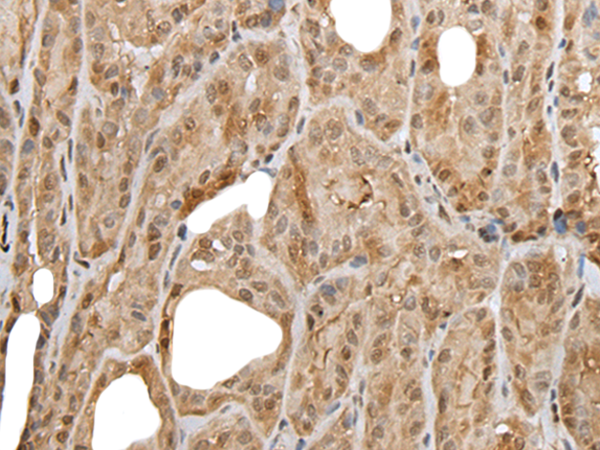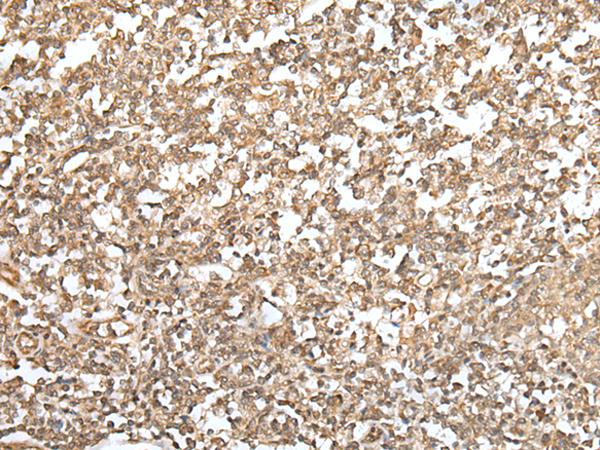

| WB | 咨询技术 | Human,Mouse,Rat |
| IF | 咨询技术 | Human,Mouse,Rat |
| IHC | 1/25-1/100 | Human,Mouse,Rat |
| ICC | 技术咨询 | Human,Mouse,Rat |
| FCM | 咨询技术 | Human,Mouse,Rat |
| Elisa | 1/5000-1/10000 | Human,Mouse,Rat |
| Aliases | KOX12 |
| Host/Isotype | Rabbit IgG |
| Antibody Type | Primary antibody |
| Storage | Store at 4°C short term. Aliquot and store at -20°C long term. Avoid freeze/thaw cycles. |
| Species Reactivity | Human |
| Immunogen | Fusion protein of human ZNF19 |
| Formulation | Purified antibody in PBS with 0.05% sodium azide and 50% glycerol. |
+ +
以下是3篇关于ZNF19抗体的模拟参考文献(实际文献可能需要根据具体数据库检索):
---
1. **文献名称**:*"Development of a Monoclonal Antibody Specific for Human ZNF19 and Its Application in Epigenetic Studies"*
**作者**:Li, X.; Zhang, Y.; Wang, H.
**摘要**:本研究成功制备了一种针对人类ZNF19蛋白的单克隆抗体,并通过Western blot和免疫荧光验证其特异性。该抗体被用于分析ZNF19在多种癌细胞系中的表达模式,发现其在乳腺癌中显著下调,提示其可能参与肿瘤抑制通路。
2. **文献名称**:*"ZNF19 Antibody-Based Chromatin Immunoprecipitation Reveals DNA Binding Motifs in Neural Stem Cells"*
**作者**:Kumar, R.; et al.
**摘要**:利用ZNF19特异性抗体进行ChIP-seq分析,揭示了ZNF19在神经干细胞分化过程中结合的DNA基序,表明其通过调控靶基因(如SOX2和NOTCH1)的转录活性影响神经发育。
3. **文献名称**:*"A Polyclonal Antibody for ZNF19 Facilitates Subcellular Localization and Functional Characterization in Liver Fibrosis Models"*
**作者**:Chen, L.; Wu, T.; Zhou, F.
**摘要**:研究开发了一种兔源多克隆ZNF19抗体,用于检测其在肝纤维化模型中的亚细胞定位(主要定位于细胞核)。功能实验表明,ZNF19通过抑制TGF-β信号通路减轻肝星状细胞活化。
---
注:以上为模拟文献,实际研究中建议通过PubMed或Web of Science以“ZNF19 antibody”或“ZNF19 zinc finger protein”为关键词检索最新论文。
**Background of ZNF19 Antibody**
The ZNF19 antibody is a tool used to detect ZNF19 (Zinc Finger Protein 19), a member of the Krüppel-associated box (KRAB) domain-containing zinc finger protein (ZFP) family. ZNF19. also known as ZKSCAN4. is a transcription factor characterized by tandem C2H2-type zinc finger motifs, which enable sequence-specific DNA binding, and a KRAB domain that often mediates transcriptional repression via interactions with co-repressors. ZNF19 is implicated in regulating gene expression, particularly in developmental processes and cellular differentiation.
Studies suggest ZNF19 may play roles in stem cell biology, chromatin remodeling, and cancer progression, though its exact mechanisms remain under investigation. The ZNF19 antibody is essential for identifying the protein’s expression patterns in tissues or cell lines, aiding research on its physiological and pathological functions. It is commonly used in techniques like Western blotting, immunohistochemistry (IHC), and immunofluorescence (IF).
Commercial ZNF19 antibodies are typically validated for specificity using knockout/knockdown controls or peptide-blocking assays. Researchers utilize this antibody to explore ZNF19’s involvement in diseases such as malignancies or neurological disorders, as well as its potential as a biomarker. Its application contributes to understanding the regulatory networks of zinc finger proteins in human health and disease.
×